Second in a three-part series, this presentation provides a view from the trenches on ways junior faculty can balance research, teaching, service, and life
The following is a transcript of the presentation video, edited for clarity.
Balancing Experiences
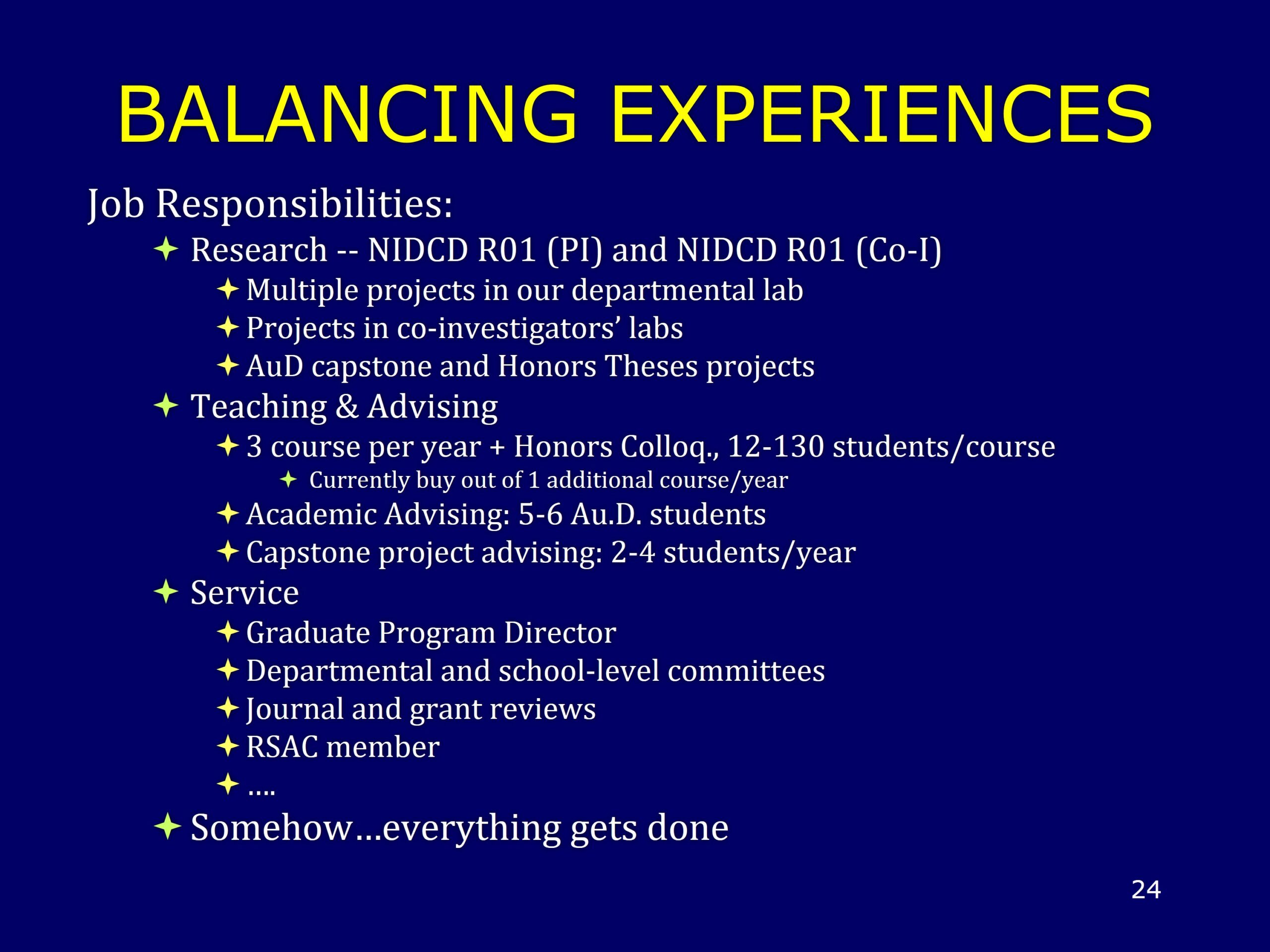
For those of you who already have academic positions, this will look familiar to you.
These are the types of activities that most of us are called upon to do in our day-to-day life. So, in my case, I’m PI on one R01, co-investigator on another one which involves managing multiple projects at different labs.
I’m also, unfortunately, capstone and honors thesis adviser for a good number of students. I say unfortunately because, as opposed to PhDs, usually there’s not a whole lot of product that comes out of these, but it’s a necessary evil.
Teaching and advising: at my institution we have a four course per year academic load. I’m fortunate enough to get buyout for being graduate program director, and also on my grant. But still, two courses a year — one of them has 120 students in it — it is a considerable amount of teaching.
Academic advising: we are fortunate to have an undergraduate academic adviser, so we don’t have to advise our undergraduate students. But that’s a new thing for us. In the past, I had 35, 40 undergraduate advisees for many, many years. I’m sure many of you will be at institutions where you also have to do undergraduate advising.
Service — I’m graduate program director, which is a one course per year release. The work I do for it is way more than a one course per year release. It involves a lot of writing memos, writing graduate admissions, which as any of you in the field know, we get lots and lots of applicants these days for our clinical training programs. It’s a lot of work. It addition to other service things like journal and grant reviewing and RSAC.
The point is, somehow, all this gets done. It seems like a lot, and it is a lot, but you learn how to balance it. I’ve been at UMass for 25 years, so over 25 years you learn how to balance everything.
What you don’t see on here is life. This was supposed to be work and life, but what didn’t make it to here is life. I also have two kids. I have a 14 year old and a 19 year old. One of my kids had an IEP for years, the other had a 504 plan. So navigating the Special Ed system as a parent is very time consuming at certain points. So life takes a lot of time. But again, somehow it all gets done. In retrospect, you wonder how, but it does.
Research 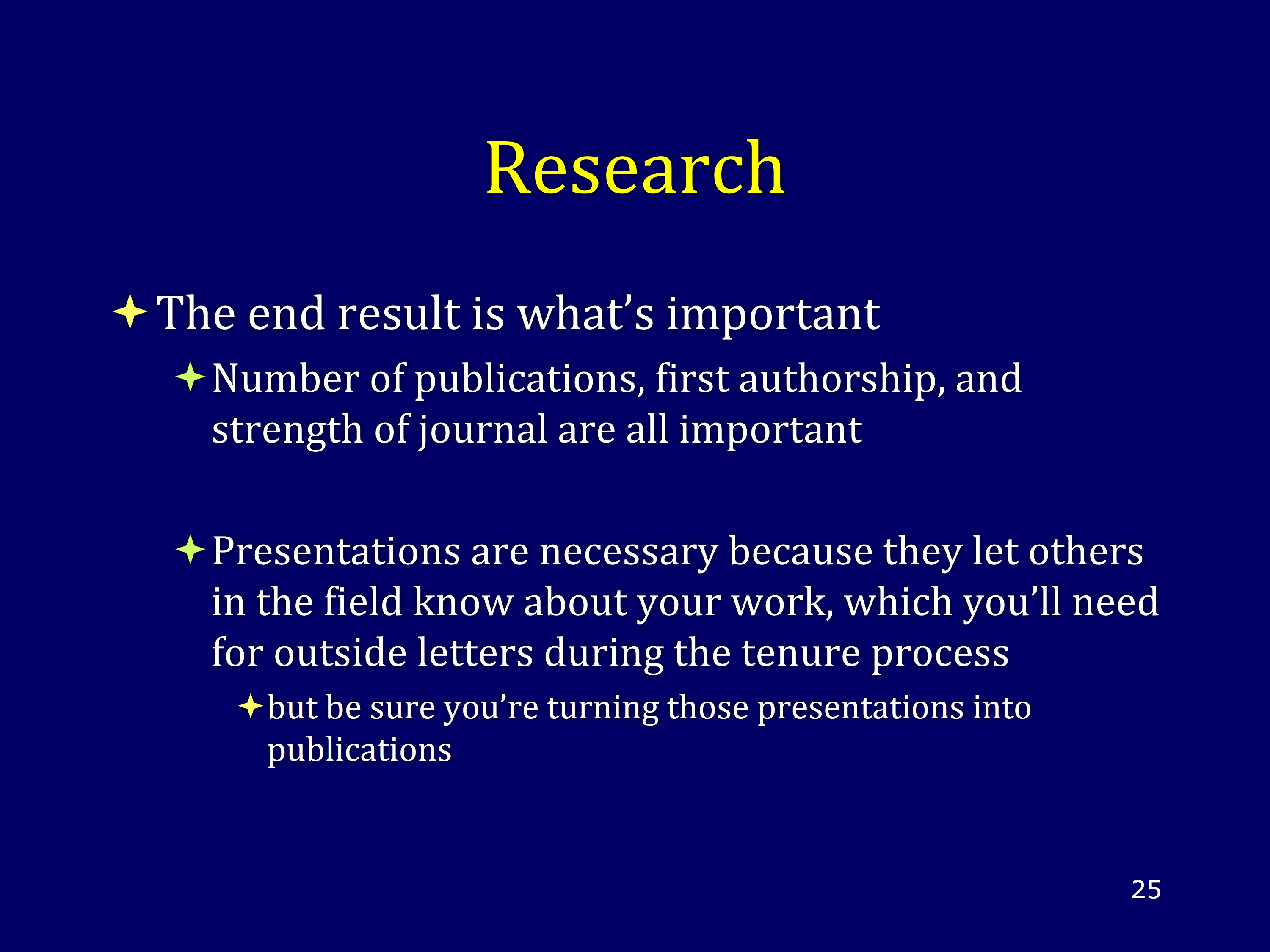
The rest of this talk is involved in some things that have worked for me. Some kernels of wisdom that I have gotten from my time being a faculty member. Some of this might not apply to you at all, and some of it might apply to you.
Like Holly had said, publications are are currency. The most important thing is to get your publications out. It really depends on what’s important at your institution, but at our institution, it’s number of publications — but it’s not only number of publications. It’s also where you are authorship-wise. Are you first author? Are you last author but lead author? And the strength of journal also is important.
Presentations are important because it’s good to network during presentations, but it’s also important to turn those presentations into publications. I’ve sat on our school personnel committee for a number of years, and one of the things I see happening is people have tens and tens and tens of presentations, but they’re not turning those presentations into publications, and that’s a problem.
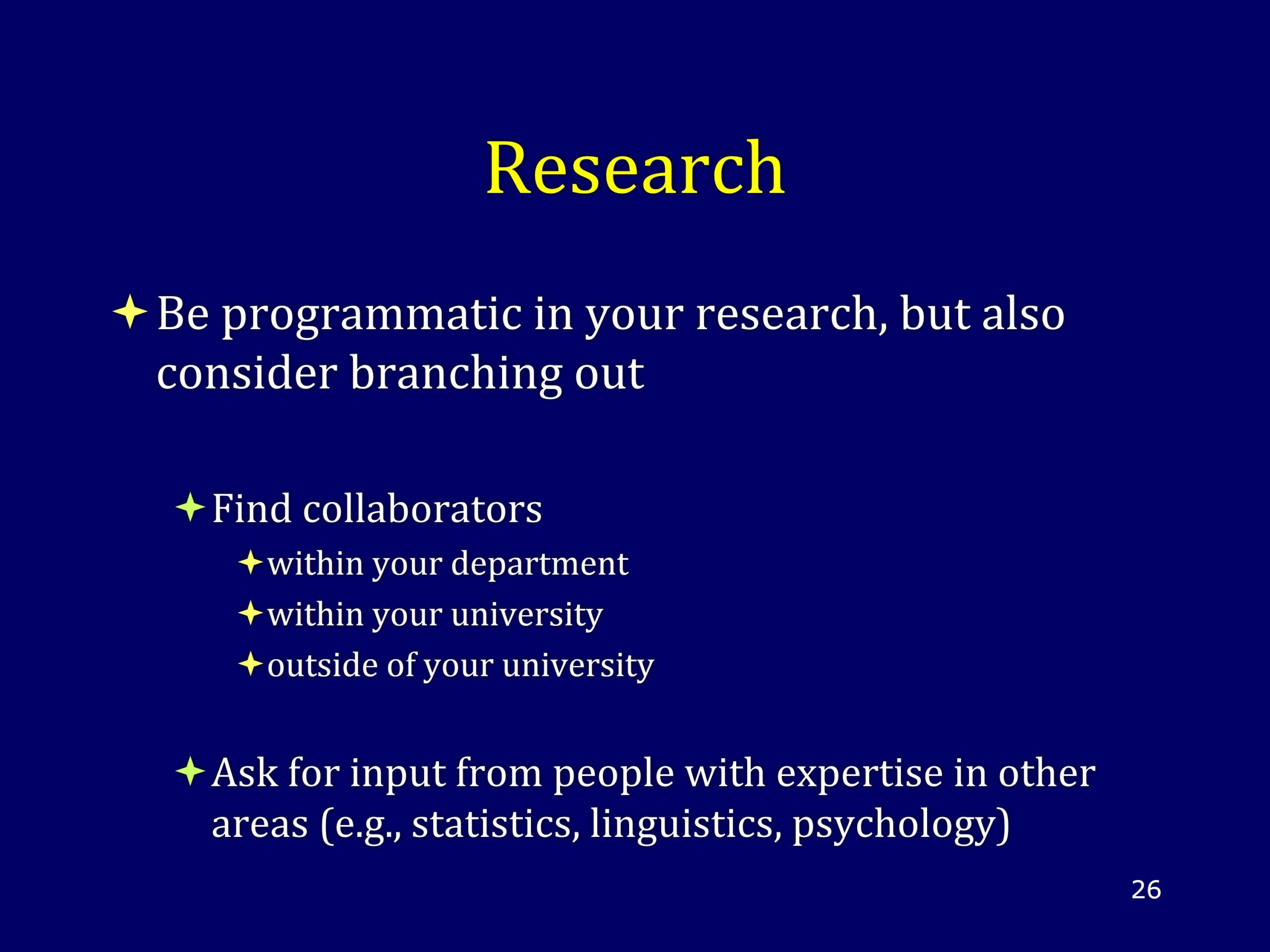
It’s important to be programmatic in your research — that is, have a research program that is actually a program that has a theme.
But it’s also good to find collaborators to help you branch out. This is more natural for some people than for others. One of the things that’s been helpful for me is the links I’ve established with people in our Psychology Department to work on things like eye tracking. And links with people at other universities. I think it’s really nice for me to reach out beyond what I was trained to do and to get expertise from other areas that help me in the things I don’t know how to do, but want to learn more about. This is a nice thing for you to do — if you haven’t started to do this already — is to establish links within your university and at other universities.
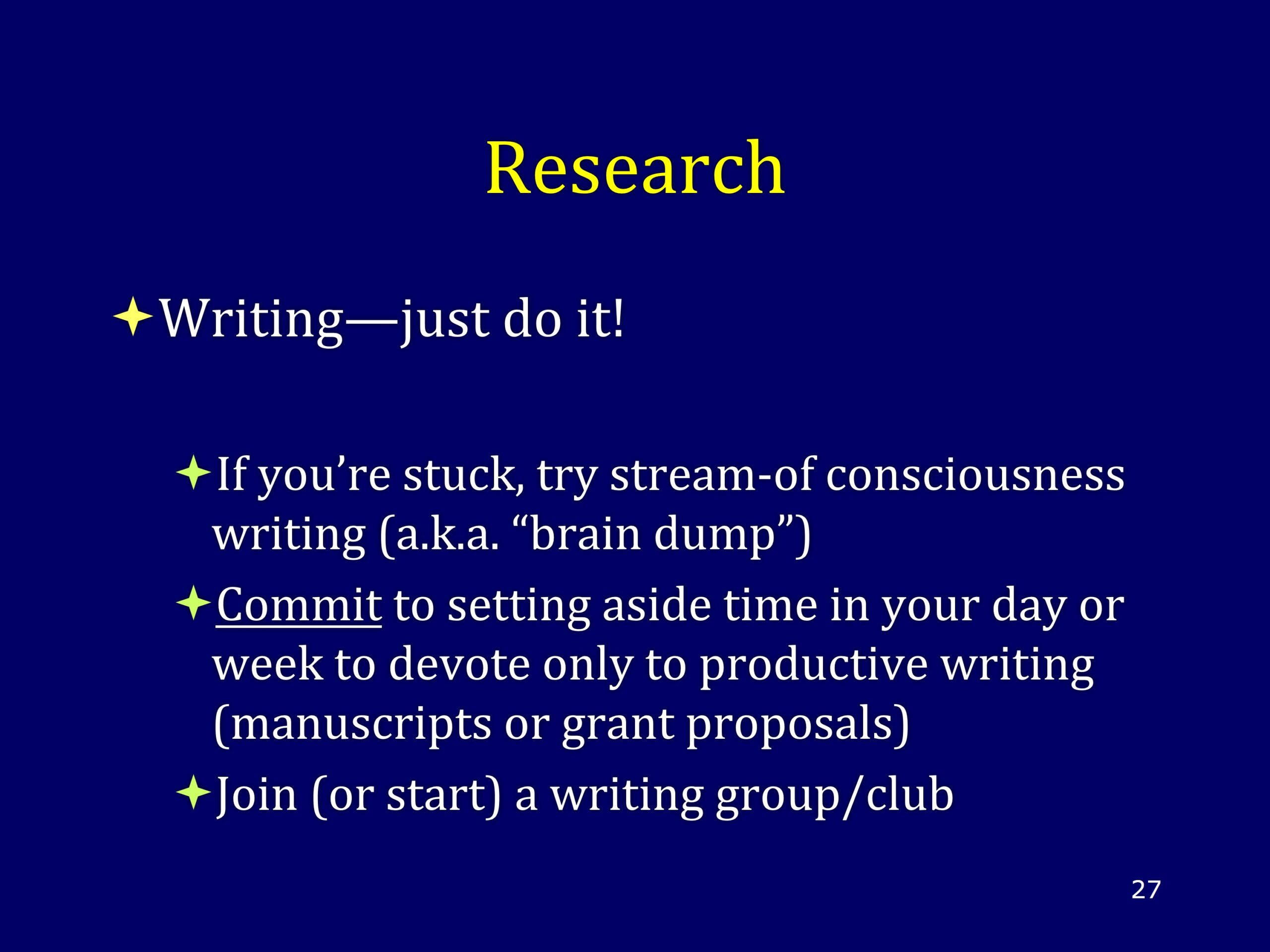
As far as writing goes. At some point you just have to stop avoiding it and sit down and write.
We have this great writing workshop at our university every year. It’s at the beginning of the summer, so it sets you up for a good summer of writing. And one of the things I’ve learned there is stream of consciousness writing, or “brain dump.” It won’t be your final product — but you don’t need to write your final product in your first draft.
Sometimes just starting is three-quarters of the battle. For me, if I can get something down on paper, and I can go back to it and say, “that’s not very good,” but often it’s better than I thought it would be.
You also have to commit to setting aside time for writing. Because it’s the easiest thing in the world to not do. You can always read another article. You can always look something up online. You can always think about how to analyze your data. But at some point you just have to write. You have to sit down and say, “I’m going to write now,” and not let anything else get in the way of that writing.
A writing group or club is great. I have a colleague who, they had an online writing club at UMass a couple years ago for the summer, where they had to check in every day or every other day about how much writing they did that day. I think that’s really effective for some people. It’s kind of like Weight Watchers — if you have to be accountable to someone, that’s really important.
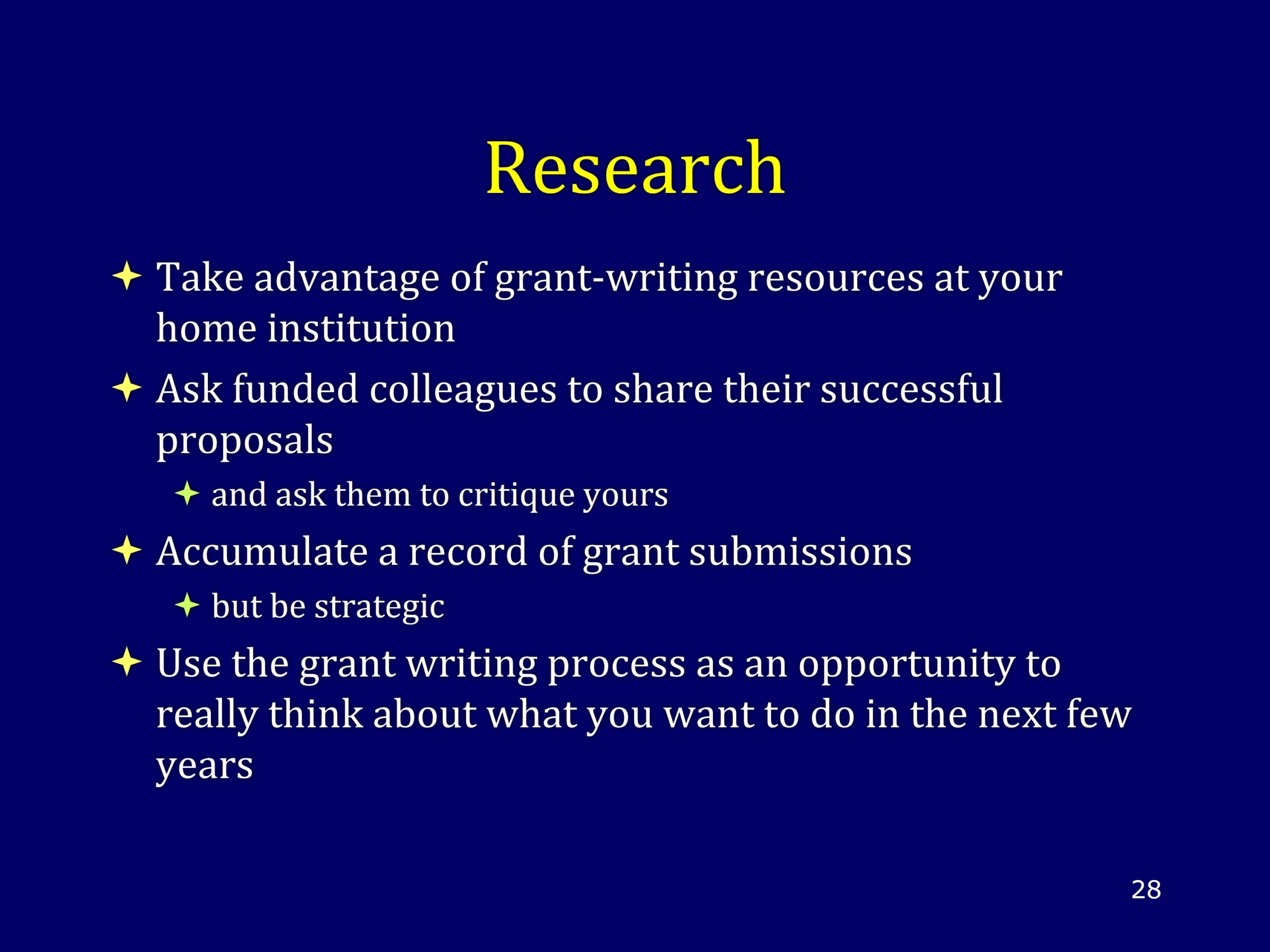
Take advantage of grant-writing resources at your institution. I know at most R1 institutions there are resources, there are workshops, and people who will read your grant. I think it’s really important to take advantage of those.
Ask people who are successful grant writers to share theirs with you. Not only to read your grant, but to share their grants so that you get a good model on what a fundable project is like.
At many institutions, when you come up for tenure, even if you haven’t gotten a grant, it’s important to demonstrate that you’re trying to get funding. You need to be strategic. I don’t know if it’s great to do ten a year, but they want to see that you’ve at least tried, even if you haven’t been successful. There’s an acknowledgement at our university how difficult it is to get federal funding. So that is taken into account, as long as they’ve seen that you’re trying, and you’re revising, and that you’re making a good effort.
There’s also a benefit of grantwriting, beyond the getting of the funding. And that is that it makes you really think about you your research program. If you’re writing a four-year grant, you need to think about what you want to be doing for the next four years. There’s a lot of value to that, even if you don’t get the grant.
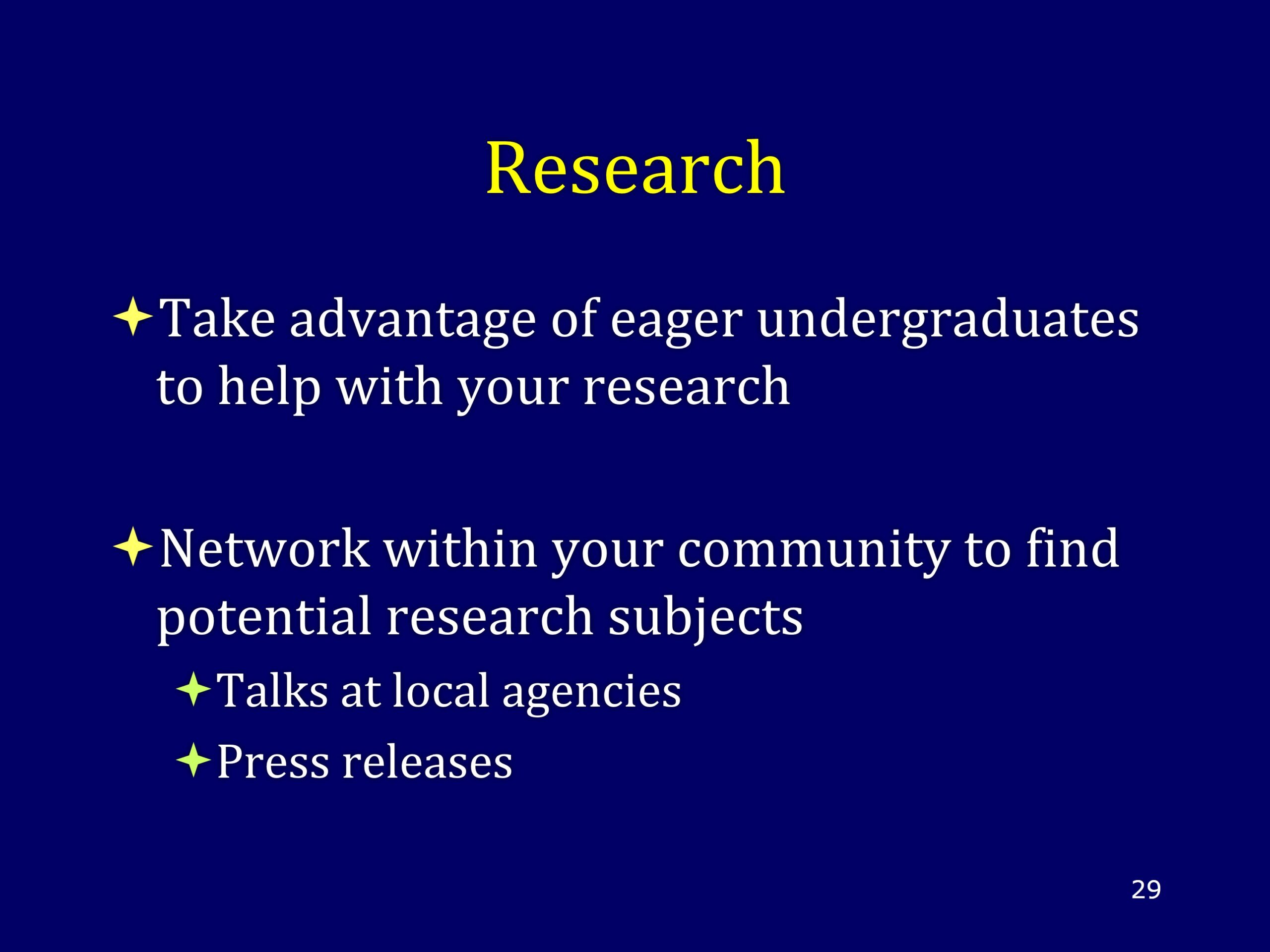
Take advantage of eager undergraduates who will help you with your research. I know our undergrads are dying to help with research. The only problem is keeping the busy sometimes, if you have too many of them. It is good to use them, but you don’t want too many of them because then you have to think about, “What am I going to do with them.”
For some of us who do clinically-based research, where we have to find research-subjects who meet certain criteria — sometimes you have to take your dog and pony show on the road and go and give presentations to local agencies to get subjects. But I think it’s a really good thing to do that benefits everybody.
This is a good thing to have your grad students do also — to develop these types of presentation skills to look for subjects.
Teaching 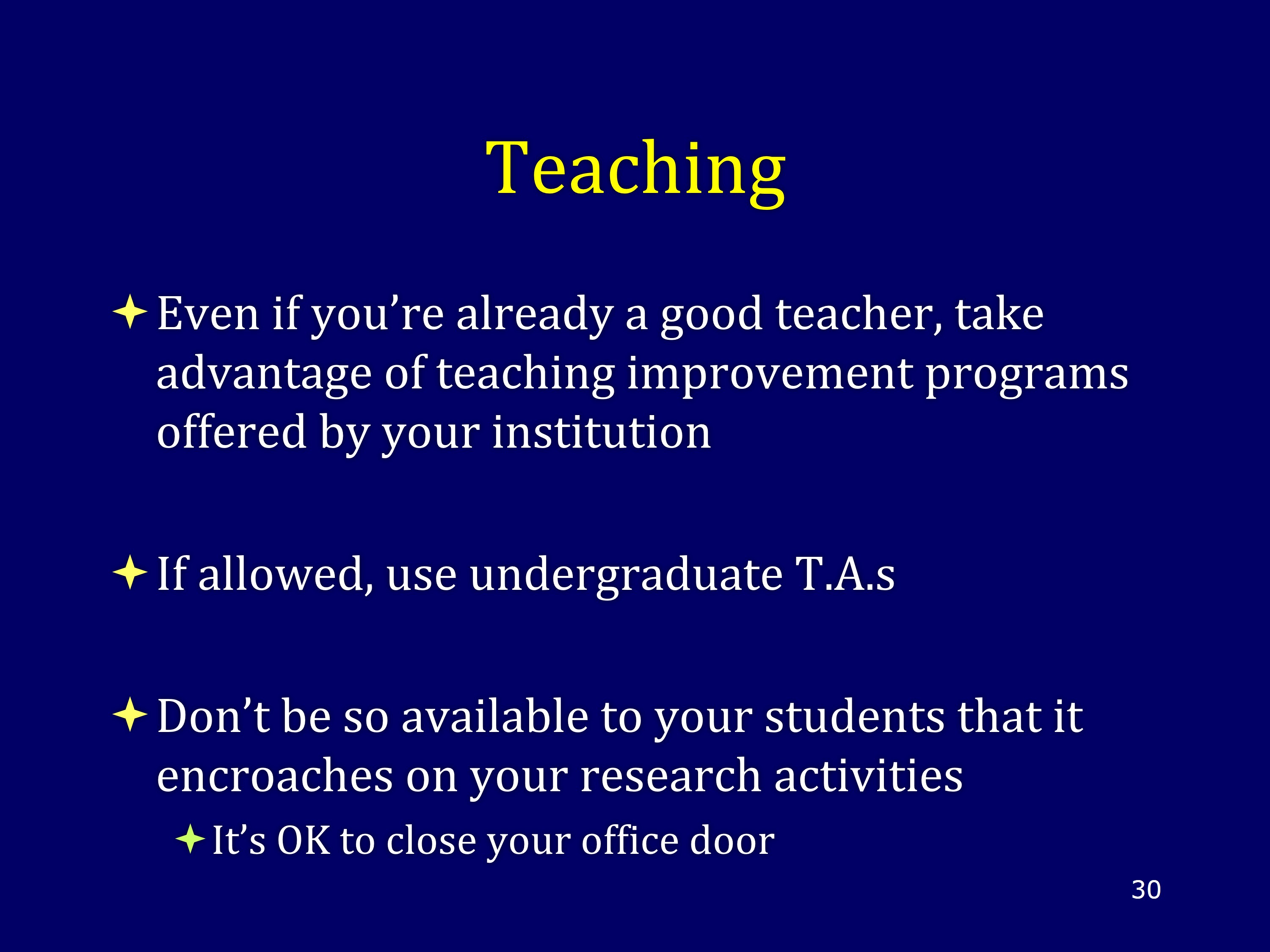
I spend most of my time on research, but I’m going to talk a little bit about teaching. Again, at our institution, even if you’re a good teacher, they want to see that you’re trying to improve. I think taking advantage of teaching improvement programs is a really good thing to demonstrate when you go up for tenure.
At our institution, we’re allowed to use undergraduate teaching assistants. I teach one junior-level class, so I use seniors, in addition to my graduate teaching assistants. If you can do this, it’s a great thing to do, because there’s a lot of scut work involved in teaching that they do a really good job with.
It’s great to be available to your students, but you need to learn how to shut your office door. Because if you’re too available to your students, it really does take away from your research time. They will eat you up if they like you. It’s really good for you to set some limits there. You can say, “You can come and see me at these particular times. But at other times, I’m going to be in my office, and I’m going to shut my door because I need to get my work done.”
Service 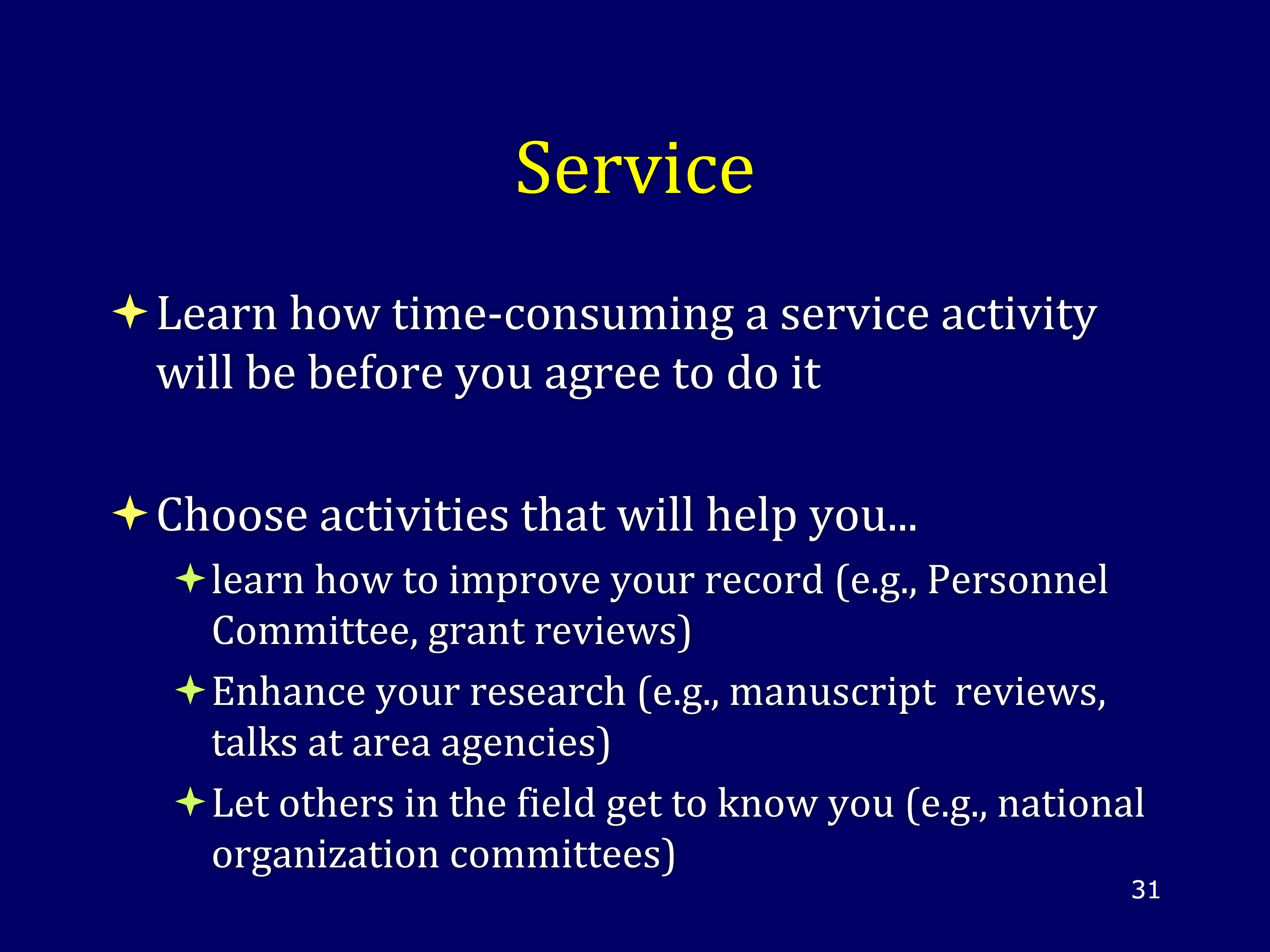
With service, it’s really important to find out what you’re getting into before you commit. It’s a very reasonable thing, especially for junior faculty members, to ask which are the least time consuming service opportunities that you can take on. In our department, we steer our junior faculty into being union rep, being library rep, sitting on the committees that never meet. Just so they can say they’re doing the service, but they’re not actually devoting a lot of time.
There are some service activities that I think can be really useful for you as a new faculty member. Things that improve your record. Sitting on personnel committee — it’s a really valuable thing for junior faculty members to see pre-tenures, so they know what people are evaluated on when they come up for tenure. Doing grant reviews. I think Cara said this morning that doing grant reviews was a really good activity, and I think it’s a great activity. Something that will enhance your research — like doing review manuscripts, talking at area agencies. And finally, letting others in the field get to know you — like being on national committees.
These things are service activities that can promote your record. And that’s what you need to devote your time to.
At my university, they don’t really count service to the university or service to the department as service they really care about. They don’t really care about service anyway — but the service they do care about is service to your profession, in terms of grant review and things like that.
Advice
What works for me.

What works for me — and this might not work for you — but I’m a real list person. Like paper and pencil list person, because I like to cross things out.
I like to make a new list every Monday morning, so I can see what did I get done with last week, and what came up that I have to do now, and what’s still on the list that never seems to get done.
I’m also a morning person. For me, I have to do anything that take thinking before about 1:00 in the afternoon when I shut down. I have to do my hard stuff in the morning — I have to write, I have to revise. And I save things for the afternoon and evening that I don’t have to think a lot about. Grading is one thing I do in the afternoon or evening. Writing letters of recommendation. Other things that don’t take a whole lot of thought.
I would say — especially for junior faculty members — use your summer wisely. If possible, don’t get talked into teaching during the summer. The summer is a really good opportunity for you to do a lot of writing and research. That’s what’s important. If you are at a research one university, you can be an okay teacher and get tenure, but you’re not going to be a weak researcher and get tenure. I would guard your summer and use it wisely. For me, it’s reading and thinking. Things I don’t get nearly enough time to do during the academic year. But writing is really important, too, to do during the summer.
Other Advice

Figure out what’s important at your university. What are the priorities, what is going to get you promoted. This will vary from school to school. But it’s a reasonable thing to ask your Chair, your Dean, or your higher administration to find out what they value.
At the end of each semester, think about your last semester and think about whether you were as productive as you want to be. And if not, what do you need to do differently? Because time goes really fast. At our university, you’ll be coming up for pre-tenure in two years. Or, you’ll start the pre-tenure process in two years. That’s not a lot of time to figure out.
This last thing — “Be Switzerland” — not that you need to keep your mouth shut if you’re a junior faculty member. But you don’t want to ruffle any feathers.
Life
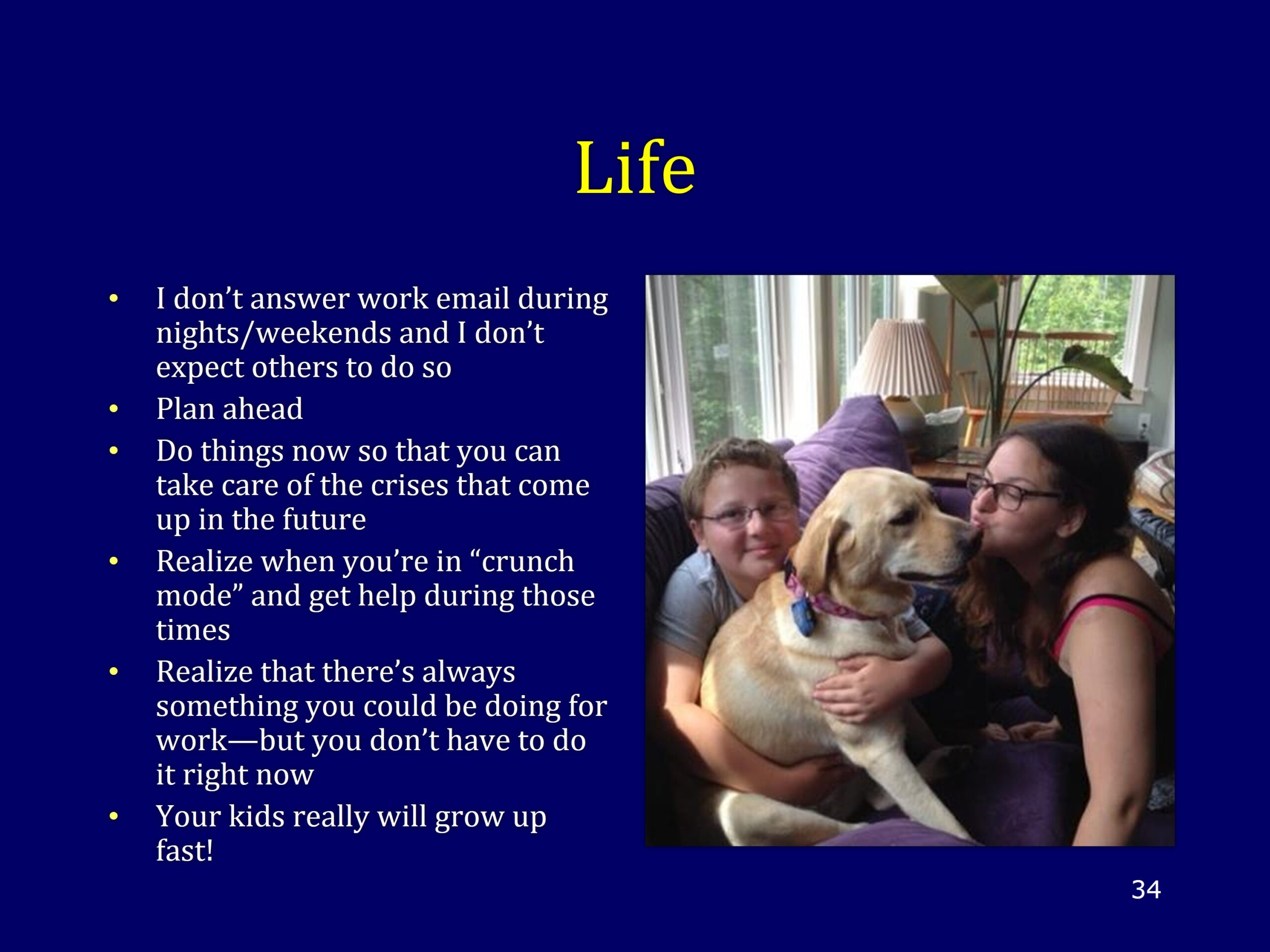
I don’t answer student emails on nights and weekends. I don’t expect my colleagues to answer emails on nights and weekends because I try to devote that time to my family.
I like to plan ahead, because you never know what crisis is going to happen next. So, if you can get things done in a timely manner, you’ll be better off.
My husband and I both have what we call “crunch mode.” Where we have periods in our work lives where things are really hectic and horrid, and we need to get help — either from each other or from outside help during those times to help us get through it.
If you’re someone who likes to get things done, one of the problems with and academic career is that there’s always something you could be doing. But it doesn’t mean you have to do it right now. You can sometimes put it off until later.
And my last piece of advice is that your kids really will grow up fast. Try to live in the moment more, and try to enjoy them while they’re small. Because before you know it, they’ll be gone.